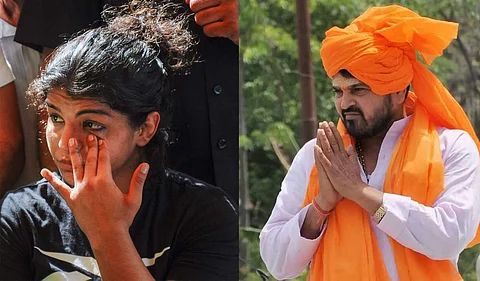
- Home
- Live Blog
- Breaking News
- Top Headlines
- Cities
- NE News
- Sentinel Media
- Sports
- Education
- Jobs

New Delhi: Rio Olympic bronze medallist Sakshi Malik detailed her wrestling journey, highlighting the struggles of being a woman in a male-dominated sport, recounting an incident in 2012 when she endured harassment from Brij Bhushan Singh, the then-president of the Wrestling Federation of India (WFI).
Reflecting on that period, she explained that speaking out could have cost her career, so she prioritised continuing her training and competing internationally, even though the environment was extremely challenging.
"I wanted to write a book for a long time, especially after the Olympics. I wanted my story to be told. I wanted it to inspire and inform many girls because of my struggles. I wanted everyone to know. After the protests, I decided this, and after a few days, I started hearing things about seniors. People said things like, 'This is the man,' and 'He's like that.' In 2012, I had an accident when then-president Brij Bhushan Singh harassed me. I knew that this was wrong and I said straightforward no to it, I have also told the story in my book, that time was really difficult for me," Sakshi told IANS.
"If I had raised my voice at that time, I wouldn’t be sitting here as an Olympic medalist today. My career would have ended right there. So, I thought it was better to stay quiet and continue without paying attention to that. After my husband's situation, it was difficult. The next 3-4 years were tough because training among those same people, competing in trials, and then going for international competitions was challenging," she added.
Sakshi decided to take a stand because she didn’t want future generations of female wrestlers to go through the same hardships. She expressed pride in the battles she fought and noted that, over time, some changes did occur, including the removal of certain individuals in power. However, the fight for reform is ongoing, and she remains committed to the cause.
"It was all very difficult, and that’s why I decided that I needed to fight for this. The things I faced, the struggles I went through, I didn’t want the next generation of girls to face them. A lot of girls get scared and are unable to continue playing. That’s why I decided to take a stand. I did well in my fights too." IANS
Also Watch: